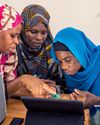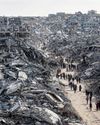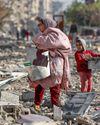
News that Pyongyang has sent 3,000 troops to train to fight in the war has horrified Ukraine, the US and Europe. But it has special significance in Seoul - 7,300km from Kyiv - where North Korea is a both an enemy and a nextdoor neighbour. What was once a European conflict is now an Asian one, too.
In return for weapons and troops, Pyongyang will secure much-needed cash and, possibly, Russian knowhow on intercontinental ballistic missiles and submarines - hardware upgrades that would intensify the threat the North already poses to its neighbours.
Events in Ukraine are being closely watched in Seoul. "North Korea's troop deployment signalled that the war in Ukraine is no longer a conflict that has little to do with South Korea," the Korea Times said in an editorial.
The soldiers are part of an eventual deployment that, according to US and Ukrainian officials, could rise to as many as 12,000.
"The massive troop dispatch indicates that Russia-North Korea ties are moving beyond the provision of rifles, shells and short-range missiles to the level of a blood alliance," the Korea Herald said.
Last Friday, Ukraine's president, Volodymyr Zelenskyy, said North Korean troops were expected imminently on the frontline in Russia's western Kursk oblast. He described the arrival of North Korea's military as an "obvious escalatory move" and called on world leaders to put "tangible pressure" on Moscow and Pyongyang.
Ukraine has occupied a small salient inside Russia for two and a half months. North Korean troops are expected to bolster Russia's ongoing attempts to kick out Ukrainian forces.
This story is from the November 01, 2024 edition of The Guardian Weekly.
Start your 7-day Magzter GOLD free trial to access thousands of curated premium stories, and 9,000+ magazines and newspapers.
Already a subscriber ? Sign In
This story is from the November 01, 2024 edition of The Guardian Weekly.
Start your 7-day Magzter GOLD free trial to access thousands of curated premium stories, and 9,000+ magazines and newspapers.
Already a subscriber? Sign In

Power play The Solar Mamas who are lighting up Zanzibar
In a dimly lit corridor of a mudwalled house nestled among coconut trees, Sharifa Hussein stripped red and black cables, a screwdriver voltage tester balanced between her lips and rolls of cable lying by her feet.

Play it again and again
Spotify's Billions Club tracks the world's most popular songs, but many greats are nowhere to be found. What are the forces shaping pop's new canon?

David Lynch 1946 -2025
The maverick American surrealist film director sustained a successful mainstream career while also probing the bizarre, the radical and the experimental

Election fever grows ....but Trump is pulling the strings
The machinations of Elon Musk andthe returning US president loom large in minds of politicians and voters

International response America's allies hope for the best-but prepare for the worst
Western allies of the US are braced for the return of Donald Trump, still hoping for the best, but largely unprepared for what may prove to be a chaotic and disorientating worst.

Mood music
Listening to, or playing, the right song can soothe pain, lift depression and help treat conditions as diverse as Parkinson's, Alzheimer's, PTSD and back pain. Neuroscientist and bestselling author Daniel Levitin gives his musical recommendations for better health, drawing on his experience of helping his friend, the legendary songwriter Joni Mitchell.

Gaza's devastation The terrible price exacted by Israel for 7 October attack
Israel began bombing Gaza on 7 October 2023 after Hamas crossed the border, killed about 1,200 people and took 251 others hostage to Gaza.
North Koreans' capture sheds new light on war
The news was sensational.

Fragile truce An agreement is in place-if it will hold matter is another
The hours-long delay in implementing the Gaza ceasefire agreement last Sunday was not a good omen for a deal that many fear could be doomed to failure as it moves through its challenging three phases.

Why did LA's wildfires explode out of control?
Acombustible combination of factors laid the groundwork for disaster as the city struggled with catastrophic blazes